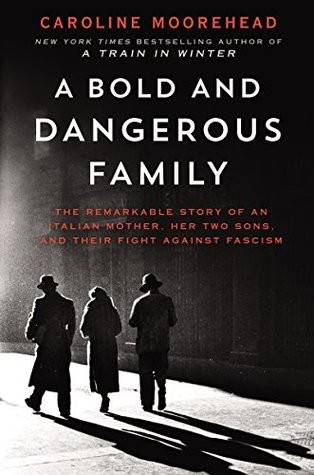
A Bold and Dangerous Family
The Remarkable Story of an Italian Mother, Her Two Sons, and Their Fight Against Fascism
کتاب های مرتبط
- اطلاعات
- نقد و بررسی
- دیدگاه کاربران
نقد و بررسی

July 15, 2017
A history of the Italian family who mounted an intrepid campaign against Mussolini.After World War I, fascism took hold in war-torn Italy, culminating in the rise of 39-year-old Mussolini as the nation's youngest prime minister. In 1922, supported by the royal family, the Vatican, and about 25,000 well-trained Blackshirts, Mussolini, demanding "full powers" to lead, faced weak opposition by socialists, communists, and liberals. In an absorbing, well-documented narrative, historian Moorehead (Village of Secrets: Defying the Nazis in Vichy France, 2014, etc.) focuses on the Rosselli family--brothers Carlo and Nello and their mother, Amelia--who became tireless leaders of an anti-fascist movement that grew in strength as Mussolini's reign of terror intensified. "Fascism," writes the author, "quickly spread its tentacles over the fabric of Italian life. The army, the aristocracy, the Church and industry, all were rallying to defend the rights of a usurper." Drawing on thousands of family letters as well as biographies of Mussolini and histories of the period, Moorehead powerfully depicts the family's anger and despair as Italy succumbed to what Carlo called "an enormous black plague." Although at first some anti-fascists hoped that Mussolini, who was "boastful, vain, cruel and erratic," would fail on his own, it soon became clear that they needed to wage a real battle. By 1927, Mussolini had abolished elections and installed himself as minister "of foreign affairs, of the interior, of war, of the navy and air force, and of corporations." Textbooks were rewritten and journalists fired if they showed "aversion" to fascism. Anti-fascists grew stronger, with Carlo standing as "the most prominent leader of the non-communist anti-fascist opposition." The author chronicles the efforts by Carlo and Nello that led to repeated arrests and incarcerations on Italy's prison islands. When he was released, Carlo took up a frantic pace of writing and speeches, traveling to Paris, London, and, during the Spanish Civil War, Spain. Constantly in Mussolini's cross hairs, the brothers finally were assassinated: 200,000 people followed their funeral procession. A vivid portrait of resistance in dark, perilous times that is not without contemporary relevance.
COPYRIGHT(2017) Kirkus Reviews, ALL RIGHTS RESERVED.

June 1, 2017
A National Book Critics Circle Award finalist, historian Moorehead offers the third in a series on World War II Resistance, this time focusing on the remarkable Rosselli family of Florence. With a 75,000-copy first printing.
Copyright 2017 Library Journal, LLC Used with permission.

September 11, 2017
Overshadowed by the traumas of the world wars and less cinematic than the Spanish Civil War, the long struggle against fascism in Italy remains obscure and its major figures on both sides unfamiliar. Historian Moorehead (Priam’s Gold) shines light on the Rosselli family—the ill-fated brothers Carlo and Nello and their pioneering feminist mother, Amelia—to illuminate the treacherous and contradictory nature of life in Il Duce’s Italy. As Mussolini gained power, Nello, the activist firebrand, and Carlo, the reflective intellectual, became antifascists committed to “saving Italy from violent, unprincipled rule.” Interweaving the Rossellis’ personal lives with discussion of Italian political movements, intellectual currents, and the machinations of the fascists, Moorehead explores the psyche of a nation, and a family, under siege. Moorehead contends that, in the early days, “had they been united and strong, the forces of democracy might have proved a match for the fascists,” but the left was badly fractured and ill-prepared to confront squads of club-wielding goons who seemingly sprang up from nowhere. These squadristi, composed largely of “people accustomed to solving problems with violence,” took up “punitive expeditions against left-wing rallies, institutions, newspapers, and factories they considered ‘nests of subversion.’ ” As well versed in Italian socialism as she is in spy-novel tropes, Moorehead combines intellectual rigor with immersive storytelling that will appeal to specialists and casual readers alike. B+w photos.

























دیدگاه کاربران